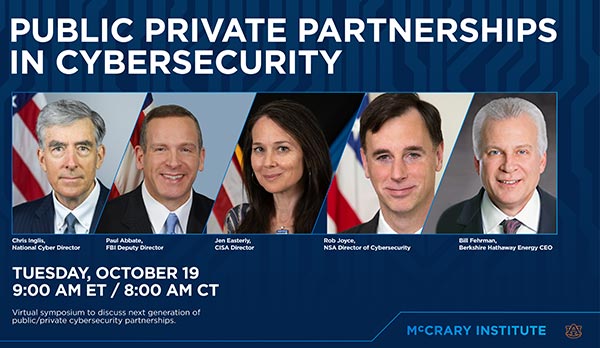Auburn University’s McCrary Institute to bring together leading public and private cybersecurity experts to build partnerships to defend against cyber attacks
Article body
Six of the nation’s most senior cybersecurity officials will gather Tuesday, Oct. 19, during an event hosted by Auburn University’s McCrary Institute for Cyber and Infrastructure Security to discuss the next generation of public/private cybersecurity partnerships. The discussion will be live-streamed.
The half-day symposium, held in Washington, D.C., begins at 9 a.m. EDT (8 a.m. CDT), Oct. 19, and will be moderated by McCrary Institute Director Frank Cilluffo, who also serves as a commissioner on the U.S. Cyberspace Solarium Commission.
President Joe Biden’s National Cyber Director Chris Inglis will kick off the event with a keynote address, followed by the cybersecurity panel of public and private sector leaders to share ideas how to make public/private cybersecurity partnerships real and meaningful. The goal is to break through bureaucratic boundaries and fight cybercrime with the full resources of the federal government and the private sector.
Participants in the panel are:
-
FBI Deputy Director Paul Abbate oversees all FBI domestic and international intelligence activities. His FBI service capacities previously included roles as a counterterrorism supervisory special agent in Iraq and domestic locations.
-
Department of Homeland Security CISA Director Jen Easterly, a two-time Bronze Star recipient and retired U.S. Army veteran, leads the efforts of the Cybersecurity and Infrastructure Security Agency to promote and defend civilian government networks, manage systemic risk to national critical functions and collaborate with state and local partners to ensure the security and resilience of the nation’s cyber and physical infrastructure.
-
NSA Director of Cybersecurity Rob Joyce is instrumental in strengthening the cybersecurity of federal networks and critical infrastructure and revamping the nation’s vulnerabilities equities process.
-
Berkshire Hathaway Energy CEO William J. Fehrman has been a senior executive within the Berkshire Hathaway Energy family of companies since 2006. During this time, he held executive roles for PacifiCorp Energy, MidAmerican Energy and BHE Renewables, managed Berkshire Hathaway Energy’s cross-business cyber and physical security strategies and served as the lead executive of Berkshire Hathaway Energy’s supply chain and procurement initiatives.
“As cyber threats continue to escalate in both scale and scope, we need to bring the full resources of all sectors to the fight,” Cilluffo said. “This discussion offers a vital opportunity for public and private sector leaders to identify and remove any barriers from a fully functional public and private partnership. We have the resources, but we are not going to win this fight without a one-team approach and sharing our expertise and knowledge of potential threats and how to best respond.’’
Register for the event at https://mccrary.auburn.edu/events/upcoming-mccrary-institute-cybersecurity-event/.
Media Contacts:
Leslie Beadle, McCrary Institute for Cyber and Critical Infrastructure Security, (beadle@auburn.edu);
Preston Sparks, Auburn University Office of Communications and Marketing, 334-844-9999 (pjs0027@auburn.edu)
Related Media
Media interested in this story can contact Communications Director Preston Sparks at (334) 844-9999 or preston.sparks@auburn.edu.
Auburn University is a nationally ranked land grant institution recognized for its commitment to world-class scholarship, interdisciplinary research with an elite, top-tier Carnegie R1 classification, life-changing outreach with Carnegie’s Community Engagement designation and an undergraduate education experience second to none. Auburn is home to more than 30,000 students, and its faculty and research partners collaborate to develop and deliver meaningful scholarship, science and technology-based advancements that meet pressing regional, national and global needs. Auburn’s commitment to active student engagement, professional success and public/private partnership drives a growing reputation for outreach and extension that delivers broad economic, health and societal impact.





